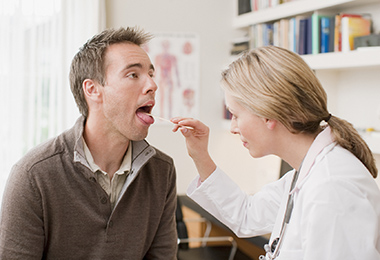Dry Mouth Remedies: 14 to Try
Xerostomia, or dry mouth, is a common side effect of radiation or chemoradiation and some medications. It can be uncomfortable, and can make it difficult to speak and eat. Whether your dry mouth symptoms are temporary or long lasting, there are some things that can help.
Water
Sip water throughout the day.
Humidifier
Using a humidifier once or twice a day, especially in your sleeping area at night, can help a lot. Cool or warm mist both work; use what you prefer. There are different kinds of humidifiers, including small, personal models, some with face masks and others that just direct steam in the air near you.
A Water Spray Bottle
Keep a spray bottle with water nearby and spray inside your mouth when needed to keep it wet. Adding a few drops of aloe or glycerin to the water can make it last longer or extend the moisturizing effects.
Glycerin (also called glycerol) is an inexpensive, flavorless and nontoxic ingredient you can find at cake decorating stores and online. It is a humectant, which means it attracts and retains moisture. Put a few drops of glycerin in water, swish it around in your mouth and spit it out. Or, make an oral spray: Use four drops of glycerin in a small spray bottle of water (4 ounces) and use as needed — you don’t have to spit it out. (Note: Do not put drops directly on tongue or in mouth. You must dilute them in water.)
Sugarless Candy, Lozenges or Gum
Having something in the mouth can trigger natural saliva production. Citrus, cinnamon and mint are good flavor choices if they are not too acidic or irritating. Look for those with aloe, xylitol, glycerin or other hydrating agents and sugarless gum with baking soda, available at many local drugstores.
More Moisture at Mealtime
Sip water between bites when eating. Adding condiments, soups, gravies and sauces can help, too.
Avoid Caffeine and Alcohol
Caffeine and alcohol can cause excessive dryness since they are diuretics.
Alcohol-free Mouthwashes
Alcohol can further dry out your mouth. Most kids’ mouthwashes are alcohol-free, and many brands have an alcohol-free option.
Saliva Substitutes
Ask your pharmacist about over-the-counter products that can come in drops or spray formulas.
Prescription Pilocarpine Medications
Ask your doctor if these are appropriate for you.
Frozen Melon or Cucumber
Try a refreshing, water-rich slice between your cheek and gum for one or two hours. If it helps, keep some thinly sliced in a small bag in the freezer and use one or more a day.
Oral Sprays or Nasal Wash
Keeping your nasal passages moist will help relieve dry mouth. Your doctor or dentist may be able to recommend some options.
Laxatives
Some fiber laxatives work by drawing water into your intestines, and they can do the same for your mouth. Ask your doctor or therapist for good brands to try. Mix some up, swish it around your mouth and spit it out. (Do not swallow it, or it could cause diarrhea.)
Papaya Tablets
Papain, the enzyme in the papaya fruit, helps digest proteins and stimulate saliva.
Acupuncture
Research shows it can help. For instance, in one study, undergoing acupuncture for eight weeks eased xerostomia in people with cancer who had been treated with radiation.






